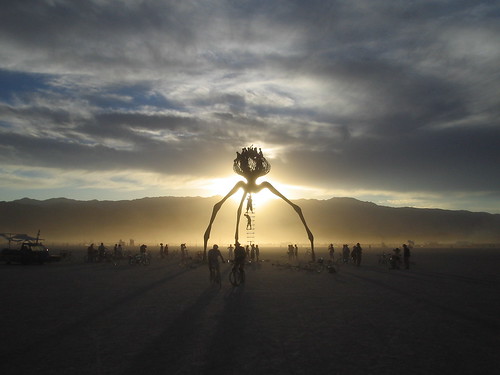
Thought it was about time to update my communications resources again. Have pasted below only a small sampling of what is available by clicking on the urls at the bottom of this post.
Have chosen an image from the "Burning Man" festival as it seems to connect with the kind of techno tribalism I've seen Graham St John talking about on the Dancecult listserv (his latest posting is about Berlin's so-called "fuck parade"). Speaking of Burning Man, this topic is covered quite extensively in the Leonardo Music Journal. I'd be interested in doing a cross-comparison with the more obviously alien/monstrous kind of collective effervescence I analysed in my earlier post on "the sociology of the secret", but it has to be remarked, the chosen image is uncannily suggestive of a possible crossover.
Journals and publications
Leonardo Music Journal - A yearly multimedia publication of the International Society for the Arts, Sciences and Technology and the MIT Press, Leonardo Music Journal (LMJ) and the LMJ CD Series publish writings and sounds by artists from diverse areas of the world who are inventing media, implementing developing technologies and expanding the boundaries of radical and experimental aesthetics.
Soundsite - published on System-X, a journal covering Philosophy of Sound and Sound Art for practitioners and theorists.
Switch Vol.2 No.1 - This issue of Switch focuses on an area that includes a broad spectrum of artists and theoreticians who use creative thought and experimentation with new technologies to speak the ancient language of "Sound" in new ways. Includes reviews of Sound Culture '96.
WFAE Readings: Selected Online Articles, Journals and Newsletters. - An excellent resource for sound researchers. The material here is divided into two collections. The first features online articles which exist on other servers world wide and are linked here for your convenience. The second collection features journals and other resources which have archived articles which you can access through those specific sites.
Intute: Arts & Humanities Guide (very comprehensive guide to theoretical resources, with emphasis on cultural studies approach aesthetics etc). Is complementary to my previous posting on Australian electronica as it links to the soundsite webpage which is primarily a forum for Australian experimental sound artists. Moreover, interested researchers should be directed to the excellent EARS project:
"The ElectroAcoustic Resource Site (EARS) project, funded by the Arts and Humanities Research Council (AHRC), "has been established to provide resources for those wishing to conduct research in the area of electroacoustic music studies". The project aims to develop a structured Internet portal, providing citations and/or direct links to texts, titles, abstracts, images, audio and audio-visual files, and other relevant resources. The current EARS website presents the results of the project's preliminary phase - a dynamic e-Glossary and Subject Index to electroacoustic music. The glossary provides an alphabetical list of terms. The subject index allows thematic access to terms, via six high-level subject headings: Disciplines of Study (DoS), Genres and Categories (G&C), Musicology of Electroacoustic Music (MEM), Performance Practice and Presentation (PPP), Sound Production and Manipulation (SPM), and Structure (Str). Each term within the glossary and subject index links through to a definition, with cross references to other terms and links to sub-sections. The project is co-ordinated at De Montfort University's Music, Technology and Innovation Research Group. The site describes electroacoustic music as an "an interdiscipline that has developed as a symbiotic interaction of disciplines including music composition, acoustics, psychoacoustics, theory of perception, cognitive science, phenomenology, computing, signal processing, amongst many others".
This site has links to many resources in not only English, but also French, German, Italian and Spanish.
Note: Intute search on "electronic music" research resources gives 151 results, of particular interest in light of my recent "hauntological post" is the Invisible Cities project, as it is about acoutistic psychogeography. Could prove to be an interesting comparison and contrast:
"Invisible Cities is the free online archive of a curated art project of the same name, funded by British Council Arts. 24 international sound artists were asked to create "an intimate series of portraits of the world's cities painted with sound", as five-minute audio works. These works are archived on the website as standard MP3 files, together with a page for each artist giving curatorial details and a description of the artist and their work. The Invisible Cities archive is hosted by Fallt Publishing, a British-based record label specialising in electronic music. The website will be of interest to practicing sound artists, as well as to curators and academics interested in areas such as psychogeography and how 'spirit of place' can become embodied in an audio work". http://www.fallt.com/invisiblecities
Other Intute search results here:
http://www.discover.ac.uk/artsandhumanities/cgi-bin/search.pl?term1=%22electronic+music%22&gateway=%25&limit=0&submit.x=11&submit.y=8



No comments:
Post a Comment